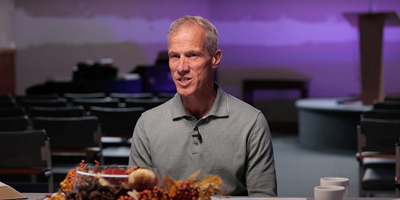If I walked down my local High Street and asked a hundred people the question: “Is Church essential?” I am guessing, because only about 10% of the population ever go to church, that the vast majority would reply, “No”, but would see other activities to be of greater importance.
Is that conclusive? How should the believer think about this? Here are some brief answers to five questions you may have.
What do we mean when we say ‘Church’?
To many people the word “church” means a building; a place where people go to hear preaching, sing, and pray. The phrase, “I am going to church”, would be commonly used to mean attending a service in one of those buildings.
Yet, that definition does not come from the Bible. In the early days, Christians did not have separate buildings to meet in, they met in homes. The term church refers to a group of people, not a building.
“Greet also the church in their house” (Romans 16:5 ESV).
“the church in your house” (Philemon 2).
Although there are many “local” churches, the Bible only speaks about one “universal” church, the “body of Christ”, consisting of all those who repent of their sin, confess that Jesus is Lord and trust in Him alone for their salvation.
“the church of God, which he obtained with his own blood” (Acts 20:28 ESV).
If we adopt the same usage of the word “church” as the Bible does then there is no doubt; the church is essential. The Lord Jesus loved the church and gave His life for it (Ephesians 5:25). The Church has a bright future and will flourish long after COVID-19.
Does God have anything to say on this subject?
We do not need to speculate on how God views the coming together of believers to worship Him in prayer, preaching and song in local churches. The Bible gives remarkably clear instructions.
“And let us consider one another in order to stir up love and good works, not forsaking the assembling of ourselves together, as is the manner of some, but exhorting one another, and so much the more as you see the Day approaching” (Hebrews 10:24-25).
The writer to the Hebrew Christians reminded them that, although they had suffered reproach and affliction, and even had their property taken away (Hebrews 10:33), they must not isolate themselves to avoid arrest, criticism, and suffering.
Collective and corporate worship was an essential part of their spiritual life. The risk of being arrested and suffering loss did not outweigh the cost of not meeting together.
The risk of spiritual harm when Christians do not meet together is great. God gives a “Spiritual Health Warning” to those who consider gathering as a church as non-essential.
A letter sent to the UK Government on 3rd November contained thoughts about the church worshipping together that reflects the tenor of Scripture:
“It is essential for the mental and spiritual health of millions of Christians. It is essential for providing the nation with the hope that Jesus Christ offers. And it is essential for the glory of God.”
Does the opinion of the majority settle the question?
Without a doubt, when God speaks then what is said is definitive. He does not add His voice as one to be considered among others. His authoritative wisdom is not open to debate but is that which must be listened to and acted upon. Through the centuries many people have repeated the phrase that “One with God is a majority”. Its origin is uncertain but its truth is not.
This should not induce any arrogance in the mind of a believer but rather humility as they understand God’s grace in revealing truth to them. However, one of the great needs in the UK is for God’s people to step forward for God and His truth. When we stand and speak for the God of the Bible, even though we may be a minority ourselves, we stand in the sovereign strength and majority of the true God.
This is a day in which the church, the body of Christ, needs to be like Elijah at Mount Carmel (1 Kings 18) and stand for the Lord, remembering that we are in the majority because He is standing with us. We can declare: “The church is essential” because God has spoken clearly.
Should Christians expect unbelievers, even those in Government, to see Church as essential?
The communications sent to UK Government authorities have been, as far as I have seen, gracious but unambiguous, declaring the God-given mandate on the one hand to gather for worship and on the other hand to submit to these governing authorities. The tension that many believers feel between those two things is understandable.
That there have been no outbreaks of COVID-19 associated with church gatherings that have followed the Government guidelines is a point well worth making. That these gatherings are a crucial lifeline for many who have been struggling with loneliness and other negative effects of lockdown is also an important consideration.
However, I should not expect an unbeliever to view “The Church” in the same way as I do, which is hopefully in line with how God sees it. Although it is correct to state to everyone that “church is essential” and explain why that is the case, some people will understandably question why we think that church gatherings should be allowed when restaurants, gyms and Bingo halls must shut. It is almost inevitable that they will not understand the case that we have made but it should not stop us making it.
Should Christians be prepared to ignore Government guidelines in this case?
You may have read through this article wondering if there would be a case made for believers to ignore the Government guidelines about church gatherings and to continue to meet, whilst adhering to other guidelines. Although there are precedents in Scripture to disobey governing authorities when their instructions directly conflict with God’s commands (Daniel 3, Daniel 6, and Acts 5), in the author’s opinion, this current situation is not one of them. This is a public health issue, not persecution of Christians.
Whilst Government may be unlikely to accept that church gatherings are essential, we know God says they are and we can all, as Christians, petition Him in prayer, asking for wisdom, courage, mercy, and grace as we seek to act in ways that honour Him. This could include making a gracious and respectful case to the governing authorities, but the crucial thing is to bring it all to the Lord who delegated that authority to them.
























